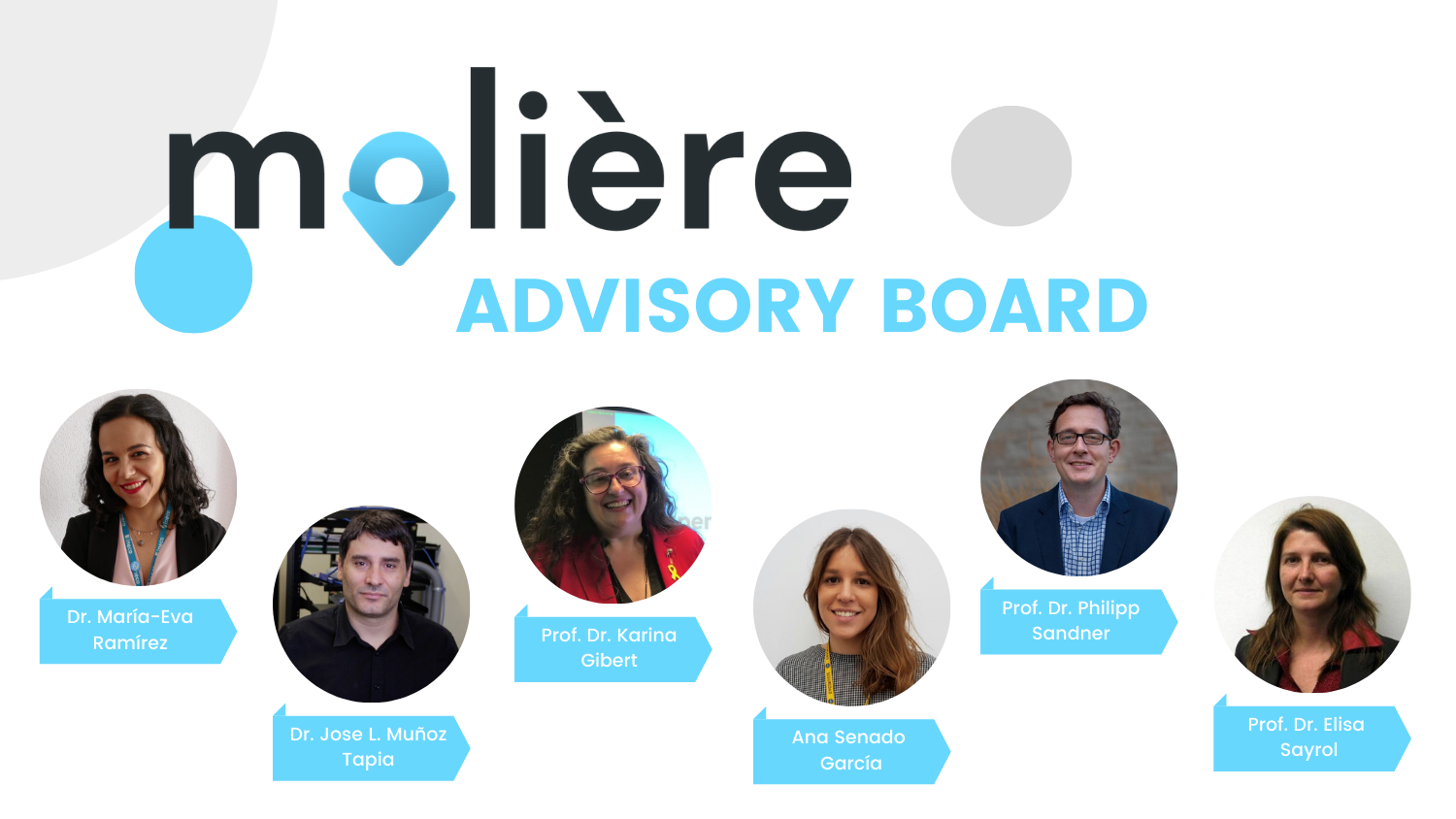- The formation of the Molière Advisory Board was announced today and the six leading members who will sit upon it.
The Molière Project, awarded by the European GNSS Agency to build the world’s best open data commons for mobility services, announced today the launch of its newly formed Advisory Board of 6 prominent experts whose focus will be to shape and guide the project during the next two years.
Well balanced between public and private members and renown experts in the GNDS and Blockchain Technology, the new board will give a timely relevant input, as well as recommendations, contributing to ensure a successful implementation of Molière, as well as raising awareness of its results and achievements.
The Molière Advisory Board members include:
Dr. Jose Luis Muñoz Tapias – Doctor in Telecommunications Engineering at the UPC, associate professor in the Department of Network Engineering at the same university and member of the Information Security Group (ISG). His areas of expertise are applied cryptography, blockchain and distributed ledger technologies, computer networks, security, and virtualization. He is also co-author of dozens of articles in several journals and congresses, as well as evaluator of projects for the Ministry of Energy, Tourism and the Digital Agenda (MINECO).
Prof. Dr. Philipp Sandner is head of the Frankfurt School Blockchain Center (FSBC) at the Frankfurt School of Finance & Management. His expertise includes blockchain technology in general, crypto assets such as Bitcoin and Ethereum, the digital programmable Euro, tokenization of assets and rights and digital identity. The FSBC advises financial organizations, industrial corporations and startups concerning their blockchain activities.
Dr. Mrs. María-Eva Ramírez has a PhD in Mathematical Sciences and 15 years of experience in GNSS from system to user experience. She works at INECO as GNSS Expert, working as part of SpaceOpal Team at the GSC (European GNSS Service Center) for Galileo Adoption and Market Development, focused mainly on EGNSS Applications on Agriculture and Geomatics domain.
Mrs. Ana Senado has an M.Sc.Degree in Telecommunication Engineer and 7 years of experience in GNSS from system operations to service provision working in different companies of the sector. She works at Telespazio Iberica as Galileo User Services support engineer and current activities are mainly focused on providing support for the implementation and adoption of Galileo in different market domains such as geomatics, agriculture and maritime.
Prof. Dr. Karina Gibert is a Full Professor at the Universitat Politècnica de Catalunya-BarcelonaTech (UPC) since 2018, and has been teaching at UPC since 1990. She is a Bachelor in Informatics Engineering with specialities in computational statistics and Artificial Intelligence, Ph.D. in Computer Science and Postgraduate in Higher Education Teaching at UPC. She is also expert of the Catalan Strategic Plan for AI of the Catalan government (Catalonia.ai) and founder of donesIAcat and donesCOEINF. Member of the advisory board of the Catalan Observatoire of Ethics in AI.
Prof. Dr. Elisa Sayrol is currently an Associate Professor at the Department of Signal Theory and Communications at UPC and belongs to the research group on image and video processing. Besides her educational and research activities, she has held different responsibilities at UPC, as Associate Dean for International Relations at the Telecom School, Dean of the Telecom School and Vicerector of Institutional Relationships at UPC, from the period from 2001 to 2012. From 2017 she belongs to the Academic Committee of CARNET and was part of the team that worked to win the KIC in Urban Mobility.
The Board is projected to meet on a formal basis twice a year, but also to be in contact by each partner along the project as each work package is further developed during the next two years.
More about the Molière project: http://moliere-project.eu
BACKGROUND
About Molière
Molière has been awarded 1,9M € in funding by the European GNSS Agency. The goal is to promote more sustainable, affordable, equitable, and accessible mobility, where micromobility and shared mobility services increasingly complement public transport. For the next months, the Molière consortium will work to demonstrate a diverse set of concrete, highly relevant mobility scenarios and use cases where geo-location data is key, addressing the needs of cities, public transport authorities, mobility service providers, and end-users.
About GSA
The GSA manages public interests related to European Global Navigation Satellite Systems (GNSS) programs, European Geostationary Navigation Overlay Systems (EGNOS), and Galileo. Galileo provides improved positioning and timing information with significant positive implications for many European services and users. Thanks to the multi-constellation of receivers that Galileo adds to, users can now know their exact position with greater precision. Galileo’s dual-frequency capability offers significant advantages in terms of achievable accuracy, but also in terms of improved resistance to jamming. The products that people use every day, from the GPS in their car to a mobile phone, benefit from the increased accuracy that Galileo provides. Galileo helps make Europe’s roads and railways safer and more efficient. Galileo boosts European innovation, contributing to the creation of many new products and services, creating jobs, and allowing Europe to own a greater share of the global market for added value services. For more information visit https://www.gsa.europa.eu/



